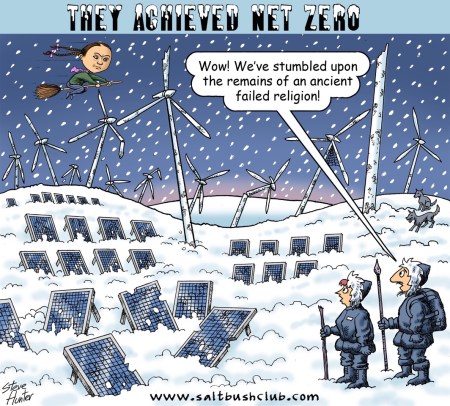Muddled Messages From The Tony Blair Institute

This is really a hopelessly muddled article in the Telegraph, written by Ryan Wain, the Tony Blair Institute’s executive director for politics and Tone Langengen, its energy policy advisor

Source: telegraph.co.uk
It starts off with this outright falsehood:
When Labour was in opposition, and even when they first took office, clean power and cheap power used to mean the same thing.
‘Renewable’ power has never been cheap.
I can only assume this has been inserted to absolve Blair of any responsibility for the £100 billion costs already imposed on energy bills as a result of the 2008 Climate Change Act.
Although the Act was passed in Brown’s reign as PM, it was undoubtedly Blair’s project. And it was Blair who introduced the Renewable Obligation subsidy scheme, which has already cost over £70 billion.
They then write:
Clean Power 2030 was the right mission when it was launched in the middle of the gas crisis: Its aim was to end our dependence on volatile fossil fuels and make Britain a clean energy leader.
Again, this is not true. It was part and parcel of Labour’s energy strategy long before the Ukraine war. Long before last year’s election, gas prices had returned close to historical levels, so why was Clean Power 2030 still a major plank of the manifesto?
Apparently, Blair now has a new mission – Cheaper Power 2030, Net Zero 2050!
But they don’t explain how they will make it cheaper. They recognise what we have been telling them for years:
Building new renewables and the grid to connect them is now more expensive, partly because of inflation and higher interest rates.
Contracts for difference – the system that guarantees a fixed price for wind and solar. Now they risk locking in high costs. The Government is essentially buying as much clean power as possible, whatever the price.
Connecting offshore wind farms to the grid could cost £112bn – more than building the wind farms themselves. Britain cannot afford to spend more on connecting clean power than generating it.
Biomass alone involves costs twice as high as gas generation or onshore wind, while carbon-capture projects risk adding over £100 per household with little gain in reliability.
That means ending wasteful biomass subsidies and pausing premature carbon-capture experiments until they prove they can cut bills. Every new clean-energy contract should lower costs, not raise them.
But still want us to pursue ‘net zero’, which is incompatible with lower costs.
As for reducing bills, their answer is to switch the cost of Tony Blair’s renewable subsidies to taxation:
First, tackle the hidden costs that keep bills high. Non-commodity charges – the levies and system costs baked into bills – have quietly pushed prices up even as wholesale costs have fallen. These need urgent reform.
Second, give families immediate relief. Suspend certain carbon taxes on gas until 2030, including removing the Carbon Price Support Levy. For the 13 million people living below the poverty line, that’s more than £250m of help when energy debts are soaring.
If Blair and his cronies really want cheaper power, they must call for ‘net zero’ to be dropped entirely.
See more here notalotofpeopleknowthat
Bold emphasis added
Please Donate Below To Support Our Ongoing Work To Defend The Scientific Method
PRINCIPIA SCIENTIFIC INTERNATIONAL, legally registered in the UK as a company  incorporated for charitable purposes. Head Office: 27 Old Gloucester Street, London WC1N 3AX.
incorporated for charitable purposes. Head Office: 27 Old Gloucester Street, London WC1N 3AX.
